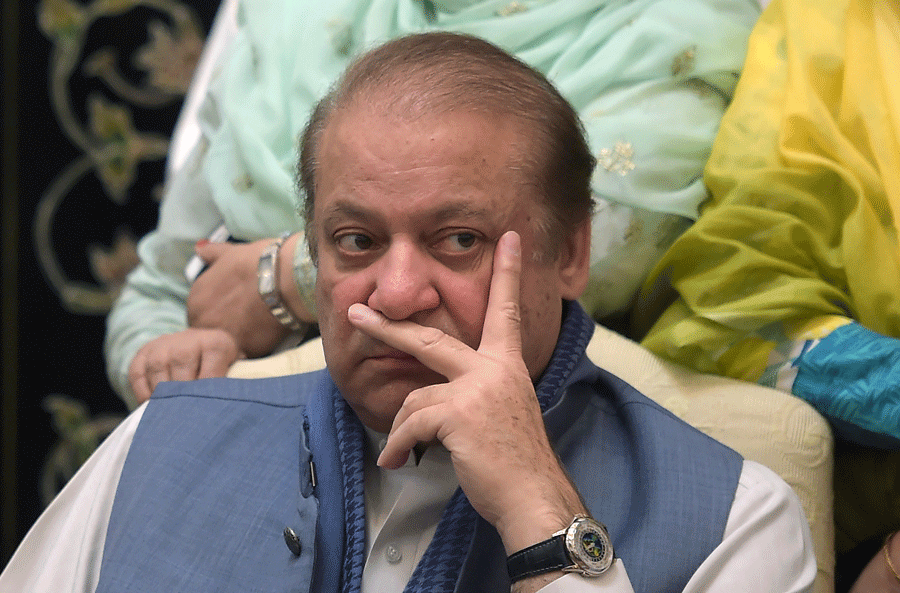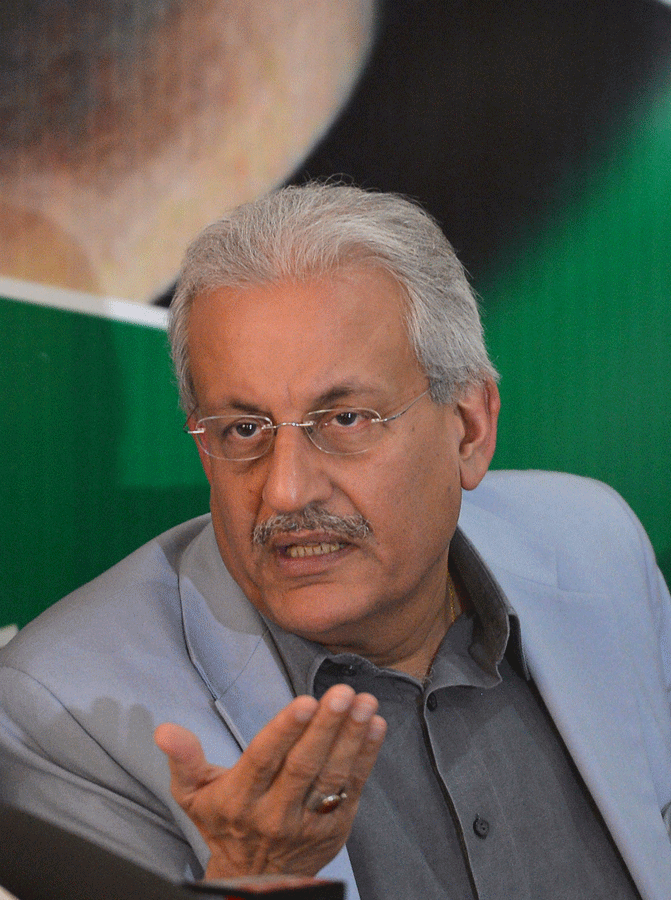Don’t Mess With the 18th Ammendment
By I. A. Rehman | Viewpoint | Published 7 years ago

A landmark consensus document: President Asif Ali Zardari signing the 18th Constitutional Amendment Bill 2010.
One of the most disturbing features of the political scene at present is the insidious campaign to undo the most important parts of the 18th Amendment. If this attempt is allowed to succeed, the gains made in the progress towards a genuinely democratic federation will be lost.
The 18th Amendment was quite appropriately described in the preamble to the relevant enactment (Act X of 2010) as a fruit of the Pakistani people’s struggle “for democracy and for attaining the ideals of a federal, Islamic, democratic, parliamentary and modern, progressive welfare state, wherein the rights of the citizens are secured and the provinces have equal share in the Federation.”
The ideals mentioned in this preamble are, perhaps, more sacred than the text of the enactment, for they remind us of the price Pakistan had to pay to run a federation as a unitary state for decades. Persistent negation of the federating units’ aspirations for autonomy was the principal cause of the state’s disintegration in 1971.
The amendment yielded much good for the state and the people of Pakistan. The guarantees of the citizens’ fundamental rights were enriched. A new article, 25 A, secured for the first time the people’s right to education. It made the state responsible for providing education to all children between the ages of five and 16. Another new article, 10 A, established the right of all persons facing criminal charges to a fair trial and due process. The people’s right to know was explicitly affirmed through Article 19 A. Article 17 reaffirmed the citizens’ right to form or join associations, unions and political parties. Article 25 was amended to guarantee all citizens’ equal protection under the law, without any discrimination.
The President’s powers were drastically curtailed, making him a ceremonial head of the state, and bringing the polity in harmony with the parliamentary system, more so than ever before. In an effort to soften the rigours of the majoritarian system, appointments to key constitutional offices were made subject to consultations with the leader of the opposition. The task of appointing judges of superior courts was assigned to a judicial commission, but was subject to endorsement by a parliamentary committee.

The 17th Amendment was repealed, except for some of its democratically approved provisions, and General Zia-ul-Haq’s name was deleted from Article 270.
The scope of Article 6, which defined abrogation of the Constitution as treason, was enlarged to include any acts that encouraged its annulment or led to its suspension. The courts were barred from validating such acts.
The concurrent legislative list was abolished and everything that was not included in the federal legislative list, came under the provinces’ legislative and executive authority. No less than 25 ministries were transferred from the federation to the provinces.
To meet its population’s persistent demand, the NWFP was renamed Khyber Pakhtunkhwa (KP). Meanwhile, the establishment of local government was made a mandatory obligation of the provincial governments and the Council of Common Interests (CCI) was strengthened.
The 27 members of the Parliamentary Committee for Constitutional Reform not only spoke for the various political parties represented in the Parliament, but also had different and often conflicting views on most of the issues under consideration. For instance, the PML-N had long been campaigning for the abrogation of the 17th Amendment introduced by General (R) Pervez Musharraf, but was not prepared to accept the cancellation of General Zia-ul-Haq’s arbitrary changes in the basic law. As a compromise, a greater part of the 17th Amendment was repealed while some of its provisions, relating to the age for voting, revival of a joint electorate and reservation of seats for women and minorities in the houses of parliament, were retained. But the efforts of the PPP and ANP to get the words ‘sadiq’ and ‘ameen’ deleted from a sub-clause of Article 62, were frustrated by the PML-N. These were the two words that led to the downfall of Nawaz Sharif.
Such differences continued to dog the parliamentary committee’s steps till the very last. The renaming of NWFP as KP and the system proposed for the selection of judges, were the sticking points that were resolved last. The committee’s success in hammering out a consensus document was due in a large measure to the persuasive skills of its chairperson, Mian Raza Rabbani. The decision to let the members put in their notes of affirmation and dissent facilitated the overall consensus in a spirit of democratic accommodation.
The final draft of the amendment did not meet the positions of several groups. Baloch and Pashtun nationalists were not satisfied with the quantum of powers allowed to the provinces, while democratic-minded sections were disappointed that all of Zia-ul-Haq’s changes in the constitution had not been undone. The procedure for the appointment of judges looked problematic from the very beginning (and eventually the superior judiciary had the formula revised vide the 19th Amendment). However, all political parties hailed the adoption of the 18th Amendment as a historic development.
That the federal bureaucracy and die-hard champions of a strong centre were not happy with a reduction in their power and prestige – especially their control over the provinces – soon became evident. All kinds of excuses were invented to delay and obstruct the devolution of powers to the provinces and the latter’s lack of capacity to expedite the process was not addressed with a degree of understanding or sympathy. As a result, the amendment has not yet been fully implemented.

Constitutional reformer: Raza Rabbani.
Incidentally, KP’s PTI-led government made 24 demands from the federation, regarding its share under the 18th Amendment. These included a share in the profits from hydel projects, the grant of a sovereign guarantee for power projects, the allocation for gas power plants, KP’s share in CPEC, a share in the Public Sector Development Programme, the provision of facilities for taxation, the extension of an invitation to the chief secretary to the Economic Coordination Council (ECC) meetings, compensation for unutilised water resources, concessions to industries in the province, the lease of railway land and relief from load shedding.
The federal government rejected all these demands. The then Senate chairman, Rabbani, constituted a Senate Committee to mediate the issue, but it remained unresolved. Now, that the PTI is in power at the centre, it may want the federation to retain more powers than the federating units.
The main opposition to the 18th Amendment comes from the bureaucratic mindset that ran the federation as a unitary state for 60 years and which created as many hurdles as possible in the implementation of the 2010 Amendment.
The rejection of the federating units’ demand to run Pakistan as a federal state, as laid down in the Constitution and the country’s founding documents, is premised on the notion that the federating units are subsidiaries of the federation and not its coordinates, as defined by constitutional theorist Albert Venn Dicey, over a hundred years ago.
In any case, nobody can claim that the 18th Amendment is the last word on constitutional reform, or that there is no room for improvement in its provisions. The issue today is not whether the reform of 2010 needs to be reviewed, but which parts of the 18th Amendment are to be changed or rolled back. The federating units want a second instalment of a devolution of powers. The lawyers have been agitating for changes in the system by which judges are appointed. Those assailing the amendment most consistently have expressed reservations about the devolution of power to the provinces and the increase in their share of the national pie.
Any attempt to trifle with the 18th Amendment to meet the latter objections is bound to cause more harm than good. The amendment has started the process of giving the federating units their due in a democratic federation and they consider it a most explosive issue. Even the PTI-led governments in the less populous provinces will not be able to defend a reversal of the steps towards making Pakistan a federation of equal units.
Mr. I.A. Rehman is a writer and activist living in Pakistan. He is the secretary general of the Human Rights Commission of Pakistan Secretariat.


